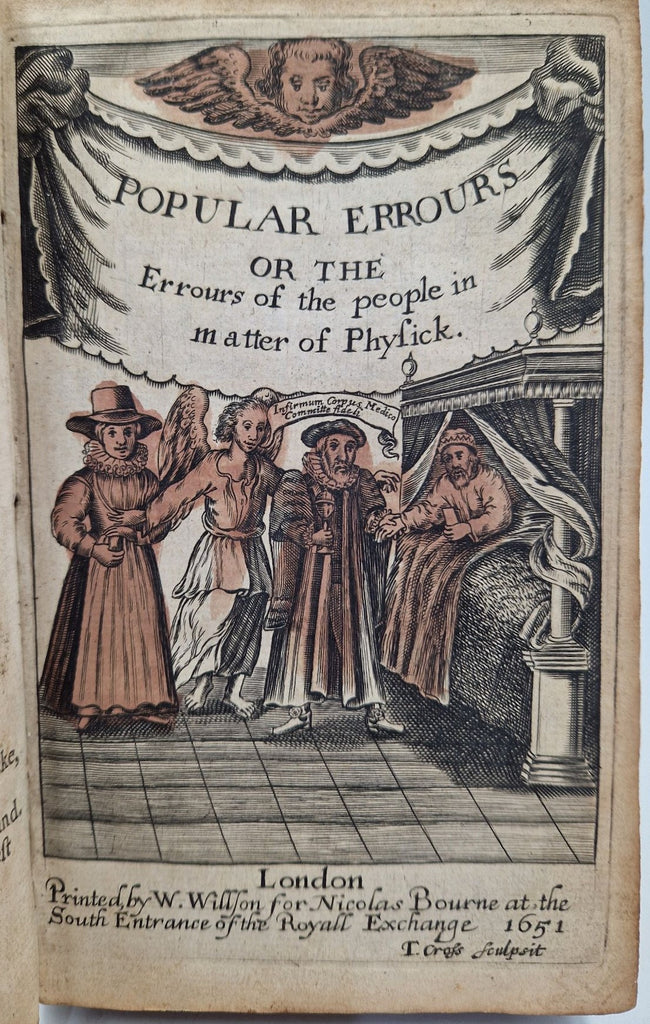Popular Errours
PRIMROSE, James






London: Printed by W. Wilson for Nicholas Bourne. 1651.
First edition in English. 8vo. 171x102mm. pp. [xxii, 461 [1bl], [7 index] [i bl], [4 adverts]. Lacking the (often missing) errata leaf. Engraved frontispiece which is also an additional title page and with the printed verse Explication. Contemporary sheep, with some rubbing and scuffing. Flat spine, lettered in gilt. Internally very good but with some browning and foxing. Front pastedown has the Fox Pointe Collection bookplate of Dr and Mrs H.R. Knohl. Front free endpaper has ownership inscription "John West's Book 1726" and the title page has, in a somewhat stylised form, the letters "IW" written twice, presumably indicating John West.
James Primrose (1600-1659) was the grandson of James VI of Scotland's principal surgeon. His father was a Calvinist minister in France where James was born and educated. He moved to England to further his medical training in Oxford and then practised as a doctor in Hull for the rest of his life. He wrote extensively on medicine especially on the circulation of blood, where he sought to hold the orthodox, Galenic line agains Harvey's new discoveries. His most popular book was the 1638 De Vulgi in Medicina Erroribus, translated in 1651 as Popular Errours by a young Hull medical colleague Robert Wittie. It is, in the words of ODNB, "a systematic attack on the non-professional practice of medicine, folk medicine, quackery, and malpractice". It refutes the, apparently common, idea that gold boiled in broth with cure consumption. But, as Primrose also claimed to have demonstrated that "tobacco is good and in no wise harmful", it is hard to know how seriously to take him - unless of course he is right about tobacco. Even if the science is a bit unreliable, this book is interesting for containing two poems (one in Latin and one in English) by fellow Hullian, Andrew Marvell in praise of Wittie's translation of Primrose's forthright and ground-breaking book.
First edition in English. 8vo. 171x102mm. pp. [xxii, 461 [1bl], [7 index] [i bl], [4 adverts]. Lacking the (often missing) errata leaf. Engraved frontispiece which is also an additional title page and with the printed verse Explication. Contemporary sheep, with some rubbing and scuffing. Flat spine, lettered in gilt. Internally very good but with some browning and foxing. Front pastedown has the Fox Pointe Collection bookplate of Dr and Mrs H.R. Knohl. Front free endpaper has ownership inscription "John West's Book 1726" and the title page has, in a somewhat stylised form, the letters "IW" written twice, presumably indicating John West.
James Primrose (1600-1659) was the grandson of James VI of Scotland's principal surgeon. His father was a Calvinist minister in France where James was born and educated. He moved to England to further his medical training in Oxford and then practised as a doctor in Hull for the rest of his life. He wrote extensively on medicine especially on the circulation of blood, where he sought to hold the orthodox, Galenic line agains Harvey's new discoveries. His most popular book was the 1638 De Vulgi in Medicina Erroribus, translated in 1651 as Popular Errours by a young Hull medical colleague Robert Wittie. It is, in the words of ODNB, "a systematic attack on the non-professional practice of medicine, folk medicine, quackery, and malpractice". It refutes the, apparently common, idea that gold boiled in broth with cure consumption. But, as Primrose also claimed to have demonstrated that "tobacco is good and in no wise harmful", it is hard to know how seriously to take him - unless of course he is right about tobacco. Even if the science is a bit unreliable, this book is interesting for containing two poems (one in Latin and one in English) by fellow Hullian, Andrew Marvell in praise of Wittie's translation of Primrose's forthright and ground-breaking book.
